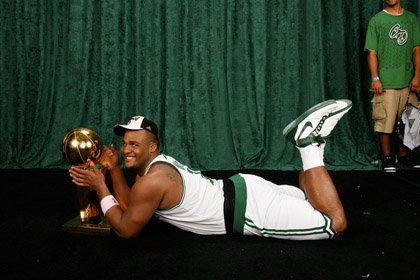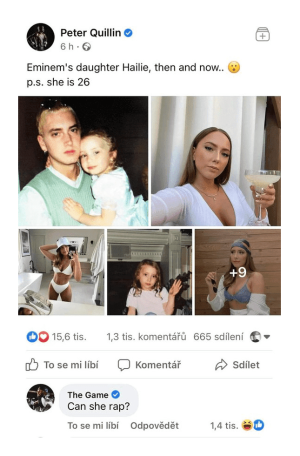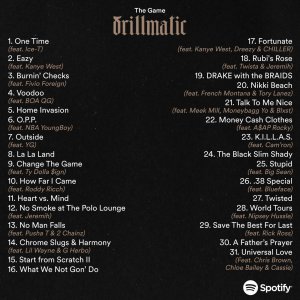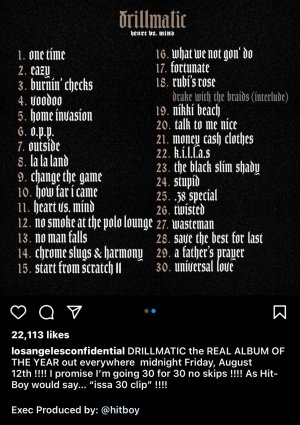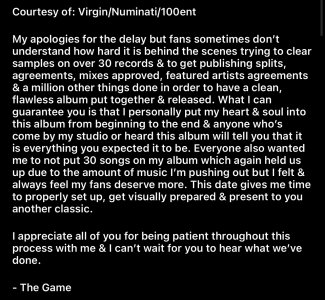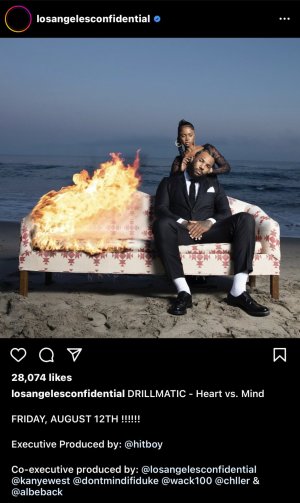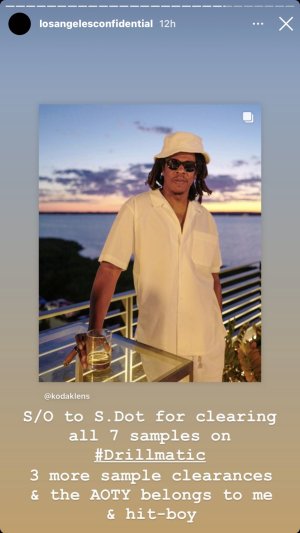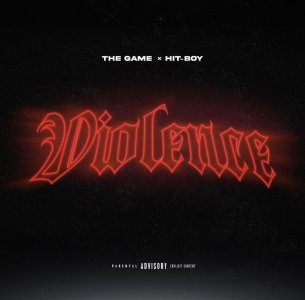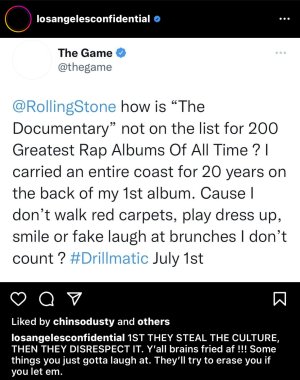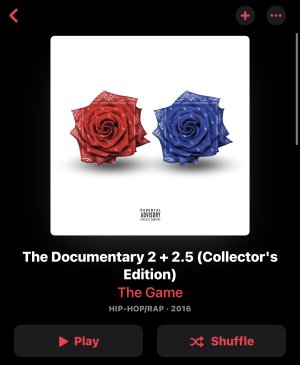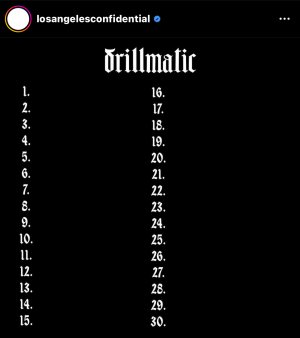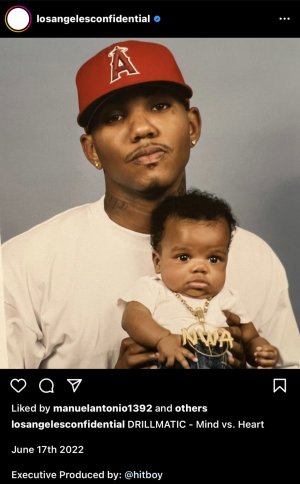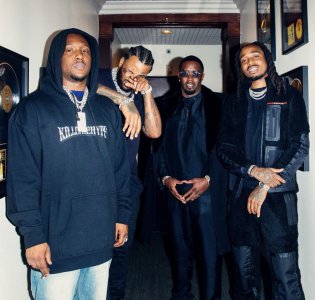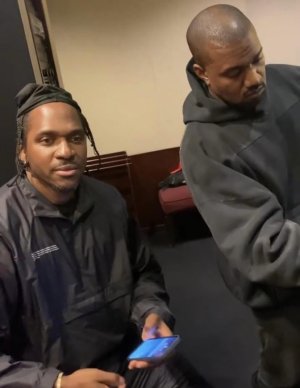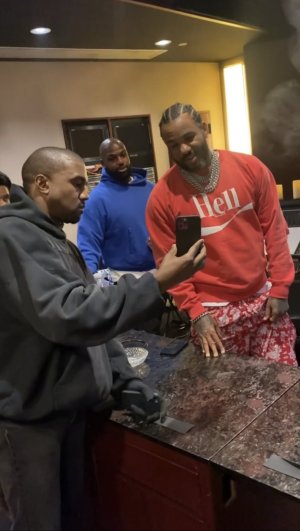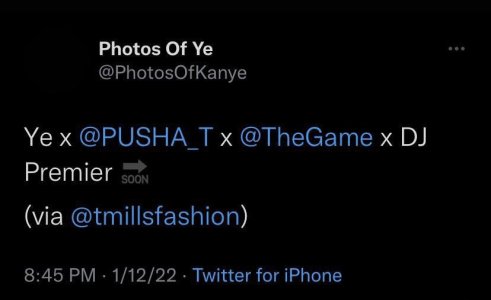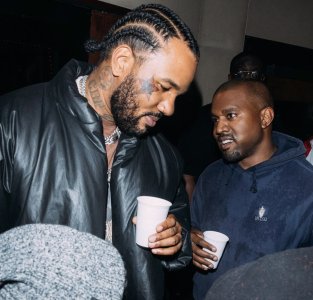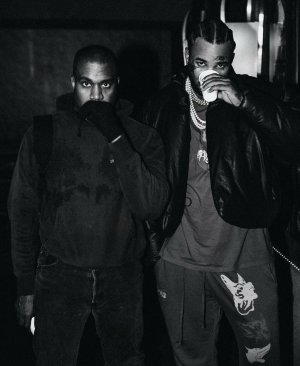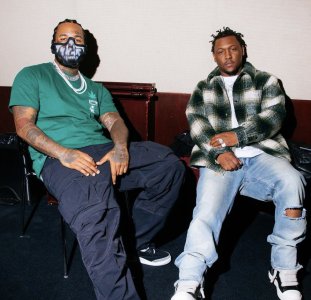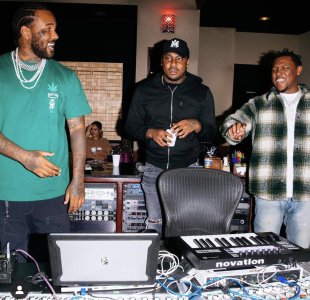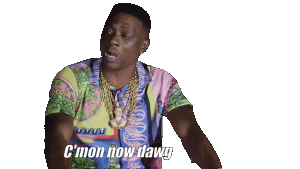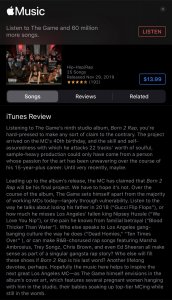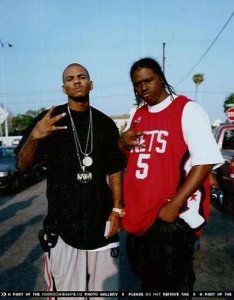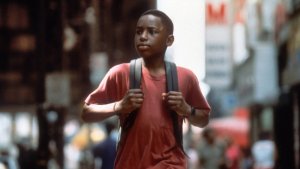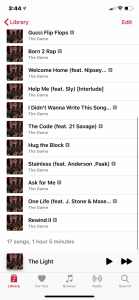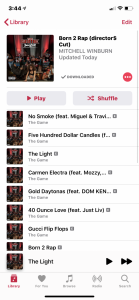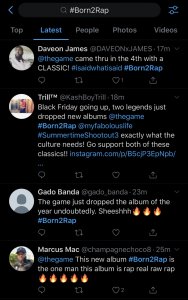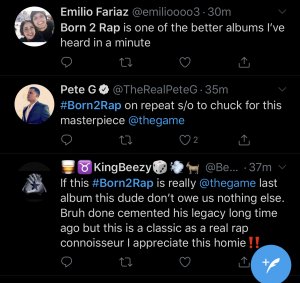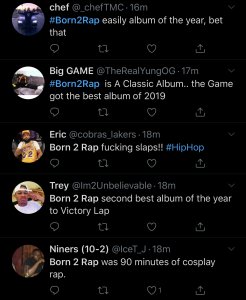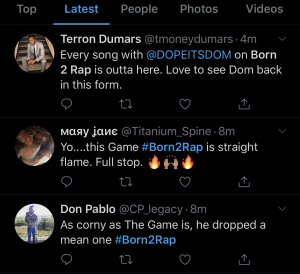- Apr 16, 2007
- 6,227
- 2,339
Gotcha, just came across this review....
http://hiphopdx.com/reviews/id.2826...strengthens-one-of-the-goat-rap-discographies
October 17, 2016 | 3:42 PM
by DX Staff
Review: The Game's "1992" Strengthens One Of The GOAT Rap Discographies
HipHopDX wants all of you readers to know we take all of our reviews very seriously, down to every last decimal point in the rating. To let all of you in on how the traditional review process goes, we decided to publish conversation that led up to The Game’s Meek Mill-slandering, eighth studio album, 1992, earning its 4.1 rating.
Trent Clark (Editor-in-Chief): I’m slightly torn with this release. Per usual, The Game is his usual domineering self on the mic with vivid lyricism and stories that bring you right into the streets of Compton. That being said, most of you probably know I’m a stickler for artists using well-worn samples and melodies. If the song is already proven to be a winner, how much props can you give the artist who’s doing the borrowing? “Funky Enough?” “Colors?” “The Message?” California is surely going to ride to it but this almost turns into a mixtape.
And yes, I’m not naive to the fact it embodies the timestamp sentiment à la an episode of Everybody Hates Chris but for a project to get the utmost reverence, the executive production team has to make their own mark in sound to give said project undeniable distinction (think good kid, m.A.A.d city, even though I never thought those beats were the strongest; they still gave the album an identity for the subject matter).
William E. Ketchum III (11-year DX contributor): The Game has always been a stickler for Hip Hop history, period. Many people get annoyed by his name-dropping, but I’ve always thought that it displayed the same type of reverence for his predecessors that so many old heads feel is missing from the industry these days. A song like “Dreams” shows both sides: at one moment he’s misquoting the year of Dr. Dre’s second album (“I woke up out that coma, 2001/’bout the same time Dre dropped 2001), and two verses later he’s vividly painting a moment in Hip Hop history when Eazy-E visited The White House. So I was pretty excited to hear that he was finally releasing a concept album dedicated to 1992 as a year because I thought it would allow Game to stretch his historian chops. And there are some truly fantastic moments where he does that here, whether it’s through storytelling and picture-painting or using samples and references to bring a feeling. “Savage Lifestyle” is one of the best Game songs in recent years, as he vividly paints a picture of the Los Angeles Riots. “True Colors/It’s On” is also great, as he takes on Ice-T’s classic single to tell his own stories of coming up through gang culture – and even if the original song wasn’t released in 1992 (the song and film dropped in 198 , it’s still a fulfilling record. Many historians will dislike the year discrepancies (this isn’t the first), but with all of the recognizable samples used across the album, it’s better enjoyed as an ode to an era (or two), as opposed to a specific year.
, it’s still a fulfilling record. Many historians will dislike the year discrepancies (this isn’t the first), but with all of the recognizable samples used across the album, it’s better enjoyed as an ode to an era (or two), as opposed to a specific year.
Aaron McKrell (One-year DX contributor): I agree that he used familiar samples liberally, but that “Savage Lifestyle” beat before it changed, was fire. I also don’t have a problem with him using “The Message” beat because that was done a generation ago, by both Ice Cube and Puffy. It’s cool to see what is arguably the greatest rap song of all time remain relevant decades later. I did have an issue with “True Colors/It’s On,” only because the sample felt lazy, but also was the most memorable part of the song. That’s not a good thing.
Trent: “Inner City Blues” is another one! With all the soulful samples we haven’t heard before, he picks that one?
Jesse Fairfax: (Four-year DX contributor): Though I’d also make a case for Ludacris, Game is perhaps Hip Hop’s greatest overachiever. Every album I’ve heard has been worth at least one listen, and he’s mastered the fine art of survival despite mediocre punchlines and tireless name-dropping. I’d attribute his ongoing relevance to the cheat codes of strong delivery, an ability to make great songs regardless of other creative shortcomings and an undeniable knack for generating beef amongst peers. Finding himself at odds over the years with everyone from 50 Cent to Lil B, somehow he’s recently become a part of a Rap Royal Rumble saga involving Meek Mill, Sean Kingston, Beanie Sigel and God knows who else, likely to promote his newest work.
William: I would say Fat Joe is a bigger overachiever than Game (and possibly Ludacris), mostly because I don’t think he’s as talented as either of them, yet he still has hit songs and manages to stay in the company of legendary rappers. Though I guess that’s besides the point.
Aaron: I did enjoy this album, though. Game managed to turn his incessant name-dropping into a timely, cohesive record that is both an homage to the old school and speaks to the struggles faced by black men in America today. I also agree with William in that I’m glad he wasn’t too literal with the 1992 title. “I Grew Up on Wu-Tang” pays tribute to a group that debuted in 1993. The aforementioned “**** Orange Juice” beat, lifted from “The Message,” which came out in 1982. I think, with The Chronic, the Rodney King tape and the L.A. riots, 1992 was the perfect year to which to hearken back. If he had stayed too strictly within that concept, though, it probably would have became tired very quickly.
TheGame_Press2
Photo: Jonathan Mannion
Here It For Yourself: Stream Game’s 1992 in full right here.
Jesse: Yeah, for all of Game’s shenanigans, my gripes with 1992 are pretty minimal.
Trent: So no one thinks the samples are an overload?
William: I’m cool with the samples because they build a nostalgic feel for the album. I think it actually works better that many of them have been used before because it helps with the sense of familiarity more than if they would’ve used samples that weren’t used as much. And familiarity is a theme that helps the album hold together well.
Jesse: The majority of the project does a good job appealing to my 36-year-old sensibilities and if Jayceon is guilty of pandering, I’d rather it be to me than today’s younger generation. In regards to the explosive opener “Savage Lifestyle,” I see some of my DX colleagues found sampling Marvin Gaye’s “Inner City Blues” to be egregious; I argue it works perfectly as a tribute to the classics played during his upbringing. As well, the concept is executed without a flaw given subject matter taking you through government conspiracies, the deaths of Martin Luther King Jr., Malcolm X and Huey P. Newton and the infamous spring ‘92 riots following the Rodney King trial. It’s enough to make you wonder why he doesn’t commit to black outrage more, but good reasoning says he has to play all sides of the field catering to degenerates, neutral old heads, and conscious gang bangers alike.
Trent: Shouldn’t he find more original ways to “vividly paint those pictures,” though? I remember when The Documentary 2 dropped and this girl who worked in the office was about 22-years-old and she couldn’t get enough of “On Me” (with Kendrick Lamar). And I’m thinking to myself “Well …yeah! It’s because it’s ‘On & On’ and it was an undeniably classic record when it dropped!” We’ve heard Game lyrically return back to the hood plenty of times but he has had much better scores to rap over.
That said, I’m definitely not knocking the album as a whole. It’s da ****. Doctor’s Advocate, track two.
Aaron: Additionally, 1992 showcases some of the strongest storytelling of his career. The story on “Young ******” about how a friend who once lived at his house turned into a stranger because he became a Crip illustrates the power of gang ties as well as any form of art I’ve consumed in a while.
Jesse: When you consider he’s paying homage to cultural relics, 1992 excels at its throwback mission. Having never seen the cult favorite film “Colors” or heard an entire Ice-T album [I was an only child with a staunch New York bias, sue me], Game’s tribute “True Colors” is a thorough walk through the horrors of growing up around gang life. “Bompton” celebrates The D.O.C. staple “It’s Funky Enough” with hood tales of police raids and Blood vs. Crip tension that I don’t hesitate to believe for a second. I’m willing to overlook the historical inaccuracies of “I Grew Up On Wu-Tang” if we’re supposed to be given a snapshot of a whole era rather than 1992 specifically. By the same measure, “However Do You Want It” (while not even remotely epic in comparison to the opening scene of Hype Williams’ cinematic masterpiece Belly) does a good job fusing Soul II Soul’s 1989 jam with modernized trap.
Trent: Bongo and the others (The Chemists Create, Phonix, WLPWR, Tycoon, etc.) did their thing but like I said, you can’t reach the top of the mountain when the originality isn’t on the glass half-empty tip. Also, “All Eyez” is outta place like so many of the album’s Bloods and Crips in the wrong neighborhoods but seeing that it is a bonus track, it somewhat gets a pass, right?. Also, Jesse, I got you on that illegal stream Colors.
William: I personally only count bonus tracks as extra credit questions. If they’re dope, they count to the album’s total score. If they make it worse I disregard them, since there’s a reason they were made bonuses.
Jesse: I overlooked the Jeremih song because I liked 80% of the album.
Trent: Does anyone care to tackle that Game = 2nd-best-discography-next-to-Kanye-in-the-past-10-years argument Will raised?
Jesse: Who are we counting in this best discography discussion? I’m assuming Kanye is first, but Kendrick is my #1 with four releases better than everyone from 2005 to now.
Aaron: I agree, Game has the second best discography since 2005.
Trent: After careful consideration, I think he’s on to something. Although … Section.80 –> good kid, m.A.A.d city –> To Pimp a Butterfly might beat out the overall quality ratio.
William: Sure, Kendrick’s three are great. Though the argument was based on artists who have been out for that same amount of time. If it were just period then I’d obviously say Kendrick is the best artist since Kanye.
Trent: I see, said the blind man.
In that case, I agree. People may have slept but he has incredible records on all his albums. I wish LAX had better executive producing because that could have been one of the top 10 double discs ever. All you had to do was separate the dark and uptempo songs for better sequencing and flow. I’ll share my version with y’all next time I pull out my hard drive … whenever that may be because … who needs hard drives anymore?
Aaron: Hey, Jesse, Nas should be in the conversation, too. Hip Hop is Dead, the untitled album, and Life is Good, as well as the stellar (I know Trent will disagree) Distant Relatives with Damian Marley. Though it’s very good, Life is Good is actually my least favorite out of all four of those albums. I know that’s an unpopular opinion.
William: Yeah, I love “latter era” Nas, but no way. Mostly because Game has at least two albums that are in the 4.5-5 territory in that time span. The highest Nas has is 4.
Jesse: I cant agree at all, either. Life is Good is the only thing I love from those years.
Trent: I will save running Nas’ discography through the guillotine for another day. What are we thinking for the rating on 1992?
Jesse: I think an even 4 is fair and good. It’s one of the more complete LPs in Game’s catalog and the comparative strength speaks to just how hit or miss he’s been for over a decade now. I’m relieved at the lack of guest appearances compared to Documentary 2 and 2.5, but it stands to reason his 2005 debut may be the only thing he has teetering on a classic (we can all thank Curtis Jackson’s hooks and Interscope’s magnificent budget at the time.)
Dollar & A Diss: “92 Bars” goes at Meek Mill’s head with the battle axe.
Trent: I’m at 4.2.
Jesse: I agree with 4.2, I just didn’t want to push my limits so I lowballed it. (Laughs).
Aaron: 4.1.
William: Surprising! I’m at a 4. I’m a big Game fan so I thought I was tripping with my 4, (Laughs). Glad to see everyone else is rocking.
http://hiphopdx.com/reviews/id.2826...strengthens-one-of-the-goat-rap-discographies
October 17, 2016 | 3:42 PM
by DX Staff
Review: The Game's "1992" Strengthens One Of The GOAT Rap Discographies
HipHopDX wants all of you readers to know we take all of our reviews very seriously, down to every last decimal point in the rating. To let all of you in on how the traditional review process goes, we decided to publish conversation that led up to The Game’s Meek Mill-slandering, eighth studio album, 1992, earning its 4.1 rating.
Trent Clark (Editor-in-Chief): I’m slightly torn with this release. Per usual, The Game is his usual domineering self on the mic with vivid lyricism and stories that bring you right into the streets of Compton. That being said, most of you probably know I’m a stickler for artists using well-worn samples and melodies. If the song is already proven to be a winner, how much props can you give the artist who’s doing the borrowing? “Funky Enough?” “Colors?” “The Message?” California is surely going to ride to it but this almost turns into a mixtape.
And yes, I’m not naive to the fact it embodies the timestamp sentiment à la an episode of Everybody Hates Chris but for a project to get the utmost reverence, the executive production team has to make their own mark in sound to give said project undeniable distinction (think good kid, m.A.A.d city, even though I never thought those beats were the strongest; they still gave the album an identity for the subject matter).
William E. Ketchum III (11-year DX contributor): The Game has always been a stickler for Hip Hop history, period. Many people get annoyed by his name-dropping, but I’ve always thought that it displayed the same type of reverence for his predecessors that so many old heads feel is missing from the industry these days. A song like “Dreams” shows both sides: at one moment he’s misquoting the year of Dr. Dre’s second album (“I woke up out that coma, 2001/’bout the same time Dre dropped 2001), and two verses later he’s vividly painting a moment in Hip Hop history when Eazy-E visited The White House. So I was pretty excited to hear that he was finally releasing a concept album dedicated to 1992 as a year because I thought it would allow Game to stretch his historian chops. And there are some truly fantastic moments where he does that here, whether it’s through storytelling and picture-painting or using samples and references to bring a feeling. “Savage Lifestyle” is one of the best Game songs in recent years, as he vividly paints a picture of the Los Angeles Riots. “True Colors/It’s On” is also great, as he takes on Ice-T’s classic single to tell his own stories of coming up through gang culture – and even if the original song wasn’t released in 1992 (the song and film dropped in 198
 , it’s still a fulfilling record. Many historians will dislike the year discrepancies (this isn’t the first), but with all of the recognizable samples used across the album, it’s better enjoyed as an ode to an era (or two), as opposed to a specific year.
, it’s still a fulfilling record. Many historians will dislike the year discrepancies (this isn’t the first), but with all of the recognizable samples used across the album, it’s better enjoyed as an ode to an era (or two), as opposed to a specific year.Aaron McKrell (One-year DX contributor): I agree that he used familiar samples liberally, but that “Savage Lifestyle” beat before it changed, was fire. I also don’t have a problem with him using “The Message” beat because that was done a generation ago, by both Ice Cube and Puffy. It’s cool to see what is arguably the greatest rap song of all time remain relevant decades later. I did have an issue with “True Colors/It’s On,” only because the sample felt lazy, but also was the most memorable part of the song. That’s not a good thing.
Trent: “Inner City Blues” is another one! With all the soulful samples we haven’t heard before, he picks that one?
Jesse Fairfax: (Four-year DX contributor): Though I’d also make a case for Ludacris, Game is perhaps Hip Hop’s greatest overachiever. Every album I’ve heard has been worth at least one listen, and he’s mastered the fine art of survival despite mediocre punchlines and tireless name-dropping. I’d attribute his ongoing relevance to the cheat codes of strong delivery, an ability to make great songs regardless of other creative shortcomings and an undeniable knack for generating beef amongst peers. Finding himself at odds over the years with everyone from 50 Cent to Lil B, somehow he’s recently become a part of a Rap Royal Rumble saga involving Meek Mill, Sean Kingston, Beanie Sigel and God knows who else, likely to promote his newest work.
William: I would say Fat Joe is a bigger overachiever than Game (and possibly Ludacris), mostly because I don’t think he’s as talented as either of them, yet he still has hit songs and manages to stay in the company of legendary rappers. Though I guess that’s besides the point.
Aaron: I did enjoy this album, though. Game managed to turn his incessant name-dropping into a timely, cohesive record that is both an homage to the old school and speaks to the struggles faced by black men in America today. I also agree with William in that I’m glad he wasn’t too literal with the 1992 title. “I Grew Up on Wu-Tang” pays tribute to a group that debuted in 1993. The aforementioned “**** Orange Juice” beat, lifted from “The Message,” which came out in 1982. I think, with The Chronic, the Rodney King tape and the L.A. riots, 1992 was the perfect year to which to hearken back. If he had stayed too strictly within that concept, though, it probably would have became tired very quickly.
TheGame_Press2
Photo: Jonathan Mannion
Here It For Yourself: Stream Game’s 1992 in full right here.
Jesse: Yeah, for all of Game’s shenanigans, my gripes with 1992 are pretty minimal.
Trent: So no one thinks the samples are an overload?
William: I’m cool with the samples because they build a nostalgic feel for the album. I think it actually works better that many of them have been used before because it helps with the sense of familiarity more than if they would’ve used samples that weren’t used as much. And familiarity is a theme that helps the album hold together well.
Jesse: The majority of the project does a good job appealing to my 36-year-old sensibilities and if Jayceon is guilty of pandering, I’d rather it be to me than today’s younger generation. In regards to the explosive opener “Savage Lifestyle,” I see some of my DX colleagues found sampling Marvin Gaye’s “Inner City Blues” to be egregious; I argue it works perfectly as a tribute to the classics played during his upbringing. As well, the concept is executed without a flaw given subject matter taking you through government conspiracies, the deaths of Martin Luther King Jr., Malcolm X and Huey P. Newton and the infamous spring ‘92 riots following the Rodney King trial. It’s enough to make you wonder why he doesn’t commit to black outrage more, but good reasoning says he has to play all sides of the field catering to degenerates, neutral old heads, and conscious gang bangers alike.
Trent: Shouldn’t he find more original ways to “vividly paint those pictures,” though? I remember when The Documentary 2 dropped and this girl who worked in the office was about 22-years-old and she couldn’t get enough of “On Me” (with Kendrick Lamar). And I’m thinking to myself “Well …yeah! It’s because it’s ‘On & On’ and it was an undeniably classic record when it dropped!” We’ve heard Game lyrically return back to the hood plenty of times but he has had much better scores to rap over.
That said, I’m definitely not knocking the album as a whole. It’s da ****. Doctor’s Advocate, track two.
Aaron: Additionally, 1992 showcases some of the strongest storytelling of his career. The story on “Young ******” about how a friend who once lived at his house turned into a stranger because he became a Crip illustrates the power of gang ties as well as any form of art I’ve consumed in a while.
Jesse: When you consider he’s paying homage to cultural relics, 1992 excels at its throwback mission. Having never seen the cult favorite film “Colors” or heard an entire Ice-T album [I was an only child with a staunch New York bias, sue me], Game’s tribute “True Colors” is a thorough walk through the horrors of growing up around gang life. “Bompton” celebrates The D.O.C. staple “It’s Funky Enough” with hood tales of police raids and Blood vs. Crip tension that I don’t hesitate to believe for a second. I’m willing to overlook the historical inaccuracies of “I Grew Up On Wu-Tang” if we’re supposed to be given a snapshot of a whole era rather than 1992 specifically. By the same measure, “However Do You Want It” (while not even remotely epic in comparison to the opening scene of Hype Williams’ cinematic masterpiece Belly) does a good job fusing Soul II Soul’s 1989 jam with modernized trap.
Trent: Bongo and the others (The Chemists Create, Phonix, WLPWR, Tycoon, etc.) did their thing but like I said, you can’t reach the top of the mountain when the originality isn’t on the glass half-empty tip. Also, “All Eyez” is outta place like so many of the album’s Bloods and Crips in the wrong neighborhoods but seeing that it is a bonus track, it somewhat gets a pass, right?. Also, Jesse, I got you on that illegal stream Colors.
William: I personally only count bonus tracks as extra credit questions. If they’re dope, they count to the album’s total score. If they make it worse I disregard them, since there’s a reason they were made bonuses.
Jesse: I overlooked the Jeremih song because I liked 80% of the album.
Trent: Does anyone care to tackle that Game = 2nd-best-discography-next-to-Kanye-in-the-past-10-years argument Will raised?
Jesse: Who are we counting in this best discography discussion? I’m assuming Kanye is first, but Kendrick is my #1 with four releases better than everyone from 2005 to now.
Aaron: I agree, Game has the second best discography since 2005.
Trent: After careful consideration, I think he’s on to something. Although … Section.80 –> good kid, m.A.A.d city –> To Pimp a Butterfly might beat out the overall quality ratio.
William: Sure, Kendrick’s three are great. Though the argument was based on artists who have been out for that same amount of time. If it were just period then I’d obviously say Kendrick is the best artist since Kanye.
Trent: I see, said the blind man.
In that case, I agree. People may have slept but he has incredible records on all his albums. I wish LAX had better executive producing because that could have been one of the top 10 double discs ever. All you had to do was separate the dark and uptempo songs for better sequencing and flow. I’ll share my version with y’all next time I pull out my hard drive … whenever that may be because … who needs hard drives anymore?
Aaron: Hey, Jesse, Nas should be in the conversation, too. Hip Hop is Dead, the untitled album, and Life is Good, as well as the stellar (I know Trent will disagree) Distant Relatives with Damian Marley. Though it’s very good, Life is Good is actually my least favorite out of all four of those albums. I know that’s an unpopular opinion.
William: Yeah, I love “latter era” Nas, but no way. Mostly because Game has at least two albums that are in the 4.5-5 territory in that time span. The highest Nas has is 4.
Jesse: I cant agree at all, either. Life is Good is the only thing I love from those years.
Trent: I will save running Nas’ discography through the guillotine for another day. What are we thinking for the rating on 1992?
Jesse: I think an even 4 is fair and good. It’s one of the more complete LPs in Game’s catalog and the comparative strength speaks to just how hit or miss he’s been for over a decade now. I’m relieved at the lack of guest appearances compared to Documentary 2 and 2.5, but it stands to reason his 2005 debut may be the only thing he has teetering on a classic (we can all thank Curtis Jackson’s hooks and Interscope’s magnificent budget at the time.)
Dollar & A Diss: “92 Bars” goes at Meek Mill’s head with the battle axe.
Trent: I’m at 4.2.
Jesse: I agree with 4.2, I just didn’t want to push my limits so I lowballed it. (Laughs).
Aaron: 4.1.
William: Surprising! I’m at a 4. I’m a big Game fan so I thought I was tripping with my 4, (Laughs). Glad to see everyone else is rocking.

 I hope it doesn't have that old school feel to it. I ain't tryna hear that ****. I'll prolly listen to it this week
I hope it doesn't have that old school feel to it. I ain't tryna hear that ****. I'll prolly listen to it this week





